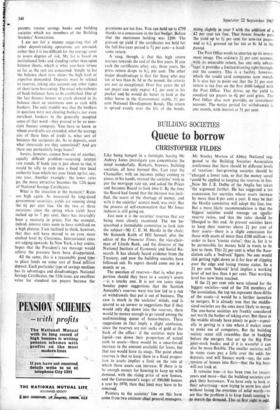Queue to borrow
BUILDING SOCIETIES CHRISTOPHER FILDES
Like being hanged in a fortnight, having Mr Aubrey Jones investigate you concentrates the mind wonderfully. Bankers, brewers, building societies, all have learned this. Last year the Chancellor, with an incomes policy coming to pieces in his hands, resisted the societies' wish to put the mortgage rate up, and asked the Prices and Incomes Board to look into it. By the time the Board had found that the increase was justi- fied, the worst of the shortage of money, and with it the societies' acutest need, was over. But the process of self-examination that Mr Jones induces is still going on.
Just now it is the societies' reserves that are being most closely examined. The PIB be- queathed a formidable committee to look into the subject—Mr C. E. M. Hardie in the chair; Mr Kenneth Keith of Hill Samuel; plus the editor of the Financial Times, the vice-chair- man of Lloyds Bank, and the director of the. National Institute of Economic and Social Re- search. It has already heard evidence from the Treasury, and now the building societies have followed suit. Its report should come out in a month or so.
The question of reserves—that is, what pro- portion should they have to a society's assets —is a touchy one. It is not ten years, since Sunday paper suggestions that the Scottish Amicable's reserves were too low led to a run of withdrawals that put it out of business. The case is much in the societies' minds, and is quoted as an answer to suggestions that if they would only dig down into the reserves, there would be money enough to go round among the undiminishing queue of house-buyers. These suggestions in fact imply a slight confusion, since the reserves are not sacks of gold at the back of the office: if the societies were less liquid—ran doWn their proportion of actual cash to assets—there would be a once-for-all increase in the amount available for loans, but that too would have its snags. The point about reserves is that to keep them in a fixed propor- tion to assets implies a limit on the rate at which those assets can increase. If there is to be enough money for housing to keep up with demand, with the rising price of new houses, and the Government's target of 500,000 houses a year by 1970, then that limit may have to be removed.
Pointers to the societies' line on this have come from two eminent chipf geneialmanagers. Mr Stanley Morton of Abbey National sug- gested to the Building Societies Association conference that there should be different levels of taxation: fast-growing societies should be
'charged a lower rate, so that the money saved ftcould be applied to keeping the reserves in line. eNow Mr J. E. Dolby of the Anglia has taken the argument further. He has suggested a tax concession for societies whose assets increase by more than 8 per cent a year. It may be that the Hardie committee will adopt this line, too. But a more likely recommendation is that the biggest societies could manage on smaller reserve ratios, and that the rules should be 'Changed to this end. At present societies have to keep their reserves above 2} per cent of their assets—there is a slight concession for those with assets of more than £100
- order to have 'trustee status'; that is, for it to be permissible for money held in trusts to be lent to them. This 21 per cent is what the Asso- ciation calls a 'bedrock' figure. No one would risk getting right down to it for fear of slipping over the edge and losing trustee status. So a 24 per cent 'bedrock' level implies a working level of not less than 4 per cent. That working level has now been reached.
If the 23 per cent rule were relaxed for the biggest societies—and of the 316 members of 'the association, the top ten.represent three-fifths of the assets—it would be a further incentive to mergers. It is already true that the middle- sized societies are the ones most likely to merge. The one-horse societies are frankly considered not worth the bother of taking over. But those in the middle already have plenty to gain—especi- ally in getting to a size where it makes sense to make use of computers. But the building society scene still resembles that in banking before the mergers that set up the Big Five joint-stock banks; and if it is wasteful it can also be more flexible. The smaller societies will in many cases pay a little over the odds for deposits, and will finance work—say, the con- ' version of houses into flats—that the big boys will not look at.
It remains true—it has been true for twenty years and more—that the building societies can pick their borrowers. You have only to look at their advertising—now trying to seem less staid without losing the overtone of solid worth—to see that the problem is to keep funds coming in to match the demand. This at first sight is 90, with a rate structure fixed when Bank rate was 11 per cent higher than it is now. It can be variously explained : the PIB'S intervention delayed an increase until the last weeks of the 7 per cent Bank rate, and early this year with- drawals were still running ahead of deposits. But the real reasons go deeper.
First, it is clear that building societies are borrowing short and lending long. Davies Investments, of unhappy memory, was not far off being a limited company in the building societies' line of business. The most obvious way of staying out of that kind of trouble is to be conservative. You cannot afford to think in terms of accepting a certain proportion of bad risks for expansion's sake. Then there are the three million 'captive borrowers' to consider. Someone who started buying a house on mort- gage (say) twelve years ago, when interest rates were lower, has no choice but to go on paying off the mortgage at the rate his building society cares to charge him. But his very defenceless- ness stirs up compassion in what are, after all, friendly societies. They claim with some justice that the recommended rate has more often been used to shield the borrower from the extremes of monetary severity than to make him pay for growth from which he does not gain.
But what this means is that the borrower has the better of things; which is why, although building society assets are expected to rise this year by over 16 per cent, the pressure of demand is as strong as ever. It has historically paid to buy your own house, which becomes worth more, with somebody else's money, which becomes worth less. Rising interest rates are in large part an attempt to compensate for this. If and when we catch up with the housing short-
age and stabilise the purchasing power of the pound, we may see advertisements saying 'Buy your house through the Bogchester—come and get it!' Until then the borrower will put up with an adverse market, with tests of credit-worthi- ness that he may not care for, and with such rules as that, made by one of the largest socie- ties, which requires him to place his house insurance through the society's broking offshoot. It will still be true that 'Such a short affliction Shall win so great a prize.'



































 Previous page
Previous page